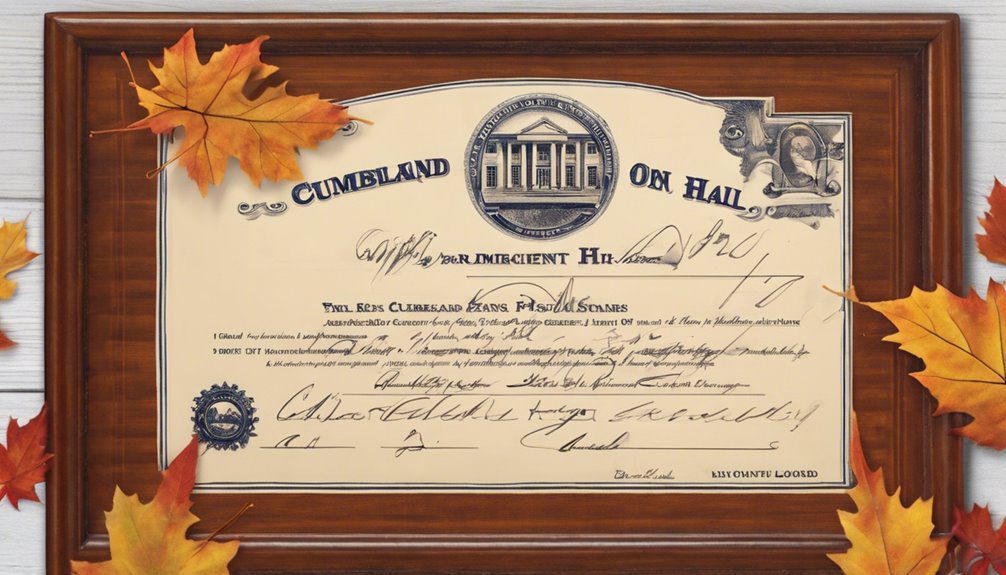If you're looking to start or grow a business in Cumberland, RI, understanding the ins and outs of license and permit bonds is crucial. These bonds not only help you comply with local regulations but also establish your credibility in the market. You might be wondering what types of bonds are available or who exactly needs one. As you navigate this process, you'll encounter specific challenges and considerations that could impact your success. Let's explore what you need to know to secure the right bond for your business.
Understanding License and Permit Bonds

License and permit bonds are essential tools for businesses seeking to operate legally and responsibly. These bonds provide a financial guarantee that you'll adhere to local, state, and federal regulations governing your industry. When you obtain a license or permit bond, you're essentially promising to follow the rules set by regulatory agencies, ensuring that your business practices are ethical and compliant.
When you apply for a license or permit bond, you're required to pay a premium, which is typically a small percentage of the total bond amount. This cost varies based on factors like your credit score and the type of business you operate. If you fail to meet the obligations of your bond, the bond company may cover any claims made against you, but you'll be responsible for repaying that amount. The bond amounts are often determined based on the level of risk associated with the industry, which underscores the importance of understanding your specific requirements.
Understanding these bonds is crucial for your business's reputation and longevity. They not only protect consumers but also help you build trust within your community.
Importance of Bonds in Cumberland
Bonds play a crucial role in Cumberland by ensuring that businesses comply with local regulations and maintain high standards of service. When you apply for a license or permit, obtaining a bond demonstrates your commitment to following the rules and protecting your customers. This not only fosters trust between you and the community but also enhances your reputation in the marketplace.
In Cumberland, bonds act as a safety net, providing financial assurance that you'll fulfill contractual obligations. If a business fails to meet its commitments, the bond can compensate affected parties, which minimizes potential losses and disputes. This protection is essential for both consumers and business owners alike.
Moreover, having a bond can give you a competitive edge. Many clients look for businesses that are bonded, as it signals professionalism and reliability. By securing a bond, you're not just fulfilling a requirement; you're also showing that you take your responsibilities seriously. Additionally, bonds such as performance bonds can provide added security for larger projects, ensuring that all parties involved meet their contractual obligations.
Types of License and Permit Bonds

When you're navigating the world of licenses and permits, understanding the different types of bonds available is essential.
License and permit bonds serve various purposes based on the industry and specific requirements of your business.
One common type is the contractor license bond, which ensures that contractors comply with local regulations and standards. This bond protects clients from potential financial loss due to a contractor's failure to fulfill their obligations.
Another type is the seller's permit bond, often required for businesses selling taxable goods. This bond guarantees that you'll collect and remit sales taxes appropriately, safeguarding the state's revenue.
Then there's the professional license bond, which is necessary for individuals in regulated professions, such as real estate agents or insurance brokers. This bond assures clients that you'll adhere to the ethical standards and regulations of your profession.
Lastly, you might encounter environmental bonds, particularly for businesses that impact the environment. These bonds ensure compliance with environmental laws and cover potential cleanup costs. Additionally, understanding the importance of surety bonds can help you make informed decisions when applying for necessary permits and licenses.
Who Needs a License Bond?
Many businesses and professionals require a license bond to operate legally and maintain compliance with state regulations. If you're in certain industries, you'll likely need this bond to ensure you meet the legal requirements set by your state or local government.
Contractors, for instance, often need a license bond to demonstrate their capability and reliability. If you're involved in construction, plumbing, or electrical work, a license bond might be a prerequisite for obtaining your business license.
Similarly, real estate agents and brokers may also need a bond, as it protects clients from unethical practices.
In addition, those in the transportation sector, such as freight brokers and carriers, typically need a license bond to secure their operations. Even some retail businesses, like auto dealerships, may require a bond to comply with state regulations. This is particularly important as used car dealer bonds are essential for ensuring accountability and protecting consumers from potential fraud.
Ultimately, if you're starting a business or providing a service that requires regulation, checking whether you need a license bond is crucial. Not only does it keep you compliant, but it also builds trust with your customers by assuring them of your commitment to ethical business practices.
The Bonding Process Explained

Understanding whether you need a license bond is just the first step; the bonding process itself can seem daunting. However, once you break it down, it's much more manageable.
First, you'll need to gather the required documentation. This typically includes your business license, identification, and any financial statements that demonstrate your ability to fulfill the bond requirements.
Next, it's time to shop around for a surety company. Not all companies are the same, so take your time comparing rates, terms, and customer reviews.
Once you've chosen a surety, you'll submit an application. This application often requires details about your business, your credit history, and the specific bond amount you need.
After your application is submitted, the surety will evaluate your risk profile. Based on this assessment, they'll determine the premium and conditions for your bond.
If approved, you'll sign a contract and pay the premium. Finally, you'll receive your bond, which you'll then file with the appropriate local or state agency.
Understanding the importance of local regulations will further ensure you're ready to meet your business obligations. Following these steps will help you navigate the bonding process with confidence.
Costs Associated With Bonds
The costs associated with obtaining a license or permit bond can vary significantly based on several factors, including your credit score, the bond amount, and the specific requirements of your industry.
Generally, you can expect to pay a premium, which is a percentage of the total bond amount. This percentage typically ranges from 1% to 10%, depending on your creditworthiness.
If you have good credit, you might secure a lower premium, while a lower credit score could lead to higher costs. Additionally, the bond amount required by the state or municipality plays a crucial role; larger bonds will naturally result in higher premiums.
Your industry's risk profile also influences the cost. High-risk industries may face steeper rates than those considered low risk.
It's essential to shop around and compare quotes from different surety bond providers to find the best deal. Some companies might offer discounts or flexible payment plans, so don't hesitate to ask.
Understanding these costs upfront can help you budget effectively and ensure you meet all necessary bonding requirements without unexpected financial strain. Furthermore, improving your credit score can significantly impact your bond costs over time.
Common Challenges in Obtaining Bonds

Securing a license or permit bond often presents several challenges that can complicate the process.
First, you might encounter issues related to your credit score. Many surety companies rely on your credit history to determine eligibility and set premiums. If your credit isn't stellar, you could face higher costs or even denial.
Another challenge is navigating the specific requirements set by your state or local government. Each jurisdiction has distinct regulations, and keeping track of these can be overwhelming. You may find yourself sifting through paperwork or waiting for approvals, which can delay your ability to obtain the bond.
Additionally, understanding the bond terms can be tricky. Some bonds come with specific conditions that you must meet to avoid penalties. Failure to comply can lead to financial repercussions or even legal issues.
Lastly, finding a reputable surety company can be daunting. You need to research and compare options to ensure you're working with a trustworthy provider. Bad credit can further complicate the bond approval process, making it essential to address any credit issues beforehand.
All of these hurdles can make the bonding process feel frustrating, but being aware of them can help you prepare for what lies ahead.
Tips for Securing Your Bond
Navigating the challenges of obtaining a license or permit bond can feel overwhelming, but there are effective strategies to streamline the process.
First, understand the specific requirements for your bond type. Research what's needed in Cumberland, RI, and gather all necessary documentation beforehand. This preparation will save you time and effort.
Next, shop around for different bonding companies. Don't settle for the first quote you receive. Compare rates and terms to find the best deal.
Also, check the bonding company's reputation by reading reviews or asking for recommendations. A reliable company can make a significant difference in your experience.
Another crucial tip is to maintain a good credit score. Many bonding companies assess your creditworthiness, so ensure your credit report is accurate and address any issues before applying.
Additionally, be ready to provide financial statements or personal guarantees if required.
Lastly, don't hesitate to ask questions. Clarifying any uncertainties will help you feel more confident in your choices. Understanding the types of surety bonds available in your jurisdiction can also aid in selecting the right bond.
Resources for Bond Seekers

When you're on the hunt for a license or permit bond, tapping into the right resources can make all the difference. Start by visiting your state's official website, where you'll find essential information about bonding requirements in Cumberland, RI. This can help you understand what's needed for your specific license or permit.
Next, consider reaching out to local business associations or chambers of commerce. They often have valuable insights and may even recommend reputable bonding companies. Networking with other business owners can also provide firsthand experiences and suggestions that are incredibly helpful.
Don't overlook online platforms that specialize in bonding services. These websites often have tools to compare rates and services, making it easier to find the best option for your needs. Additionally, reading reviews or testimonials can give you a sense of reliability. Understanding state regulations is crucial as they can vary significantly and affect your bonding process.
Conclusion
In Cumberland, RI, securing a license and permit bond is crucial for your business's success. These bonds not only help you comply with local regulations but also build trust with your customers. By understanding the bonding process and addressing any challenges you may face, you can streamline your application and potentially lower costs. Remember, maintaining a strong credit score can make a big difference. Take the necessary steps today to protect your business and ensure its growth.


